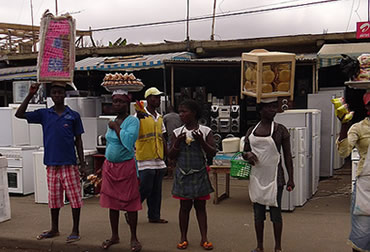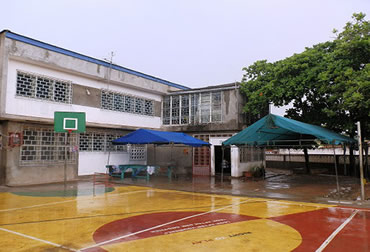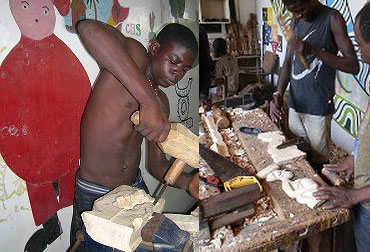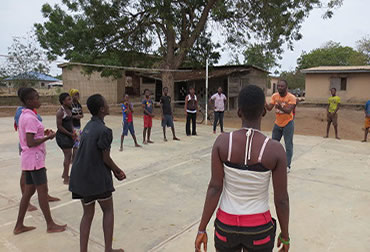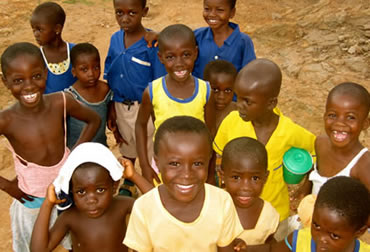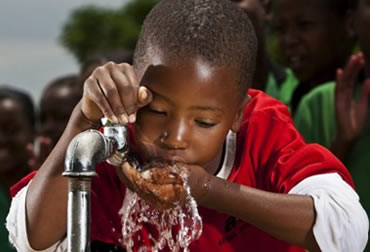
Our Projects
Brief Introduction
Catholic Action for Street Children (CAS) ProjectsCAS staff carry out ‘fieldwork’ daily, meaning they visit the streets to be with the children to find out where they work and sleep, and inform them of CAS activities and programs. Several meeting points have been established at different locations in Accra and they act as the contact places where children can meet CAS fieldworkers. Fieldworkers interact with the street children and offer them the opportunity to use the services of the refuge. In this way children can benefit from the work of CAS.
CAS runs a ‘House of Refuge’ in Laterbiokorshie, Accra. Here, street boys and girls come daily to take part in programs and activities. They can also receive medical treatment, wash and keep their belongings and money safe. Very importantly, the Refuge is a place where they can receive advice and education to help them with their everyday life and for their future. Children attend literacy classes, receive an introduction to different trades or simply play sports and games.
There is a possibility to ‘ go on sponsorship’, which means CAS helps a child who is ready to move off the street and learn a trade or go to school. CAS’ Hopeland Training Centre is a place where children go to prepare before going on to be sponsored. CAS comes into contact with many young adults (men and women) older than 18 years but does not support them. Children below 18 years old are welcome at the Refuge. We are strict about this in order to protect and encourage the smaller and younger children.
Field Works
CAS staff carry out ‘fieldwork’, meaning they visit the streets to be with the children to find out where they work and sleep and inform them of CAS activities and programmes. Fieldworkers interact with the street children and offer them the opportunity to use the services of the refuge. In this way children can benefit from the work of CAS.
CAS sees it as an important part of its work on the streets. The fieldworkers meet the street children and start a friendship. They talk to the children, gain a level of trust, listen to their problems and sometimes give advice. They give the child advice and information about the various possibilities CAS can offer them. The street corner facilitators teach health education, life skills and literacy at selected meeting points.
Meeting points are mostly different places such as verandas of shops, areas around public toilets or public bath houses. Children are encouraged to visit the refuge at their own free will. It is entirely up to the child whether they decide to continue the contact and come to the refuge or not. All the fieldworkers and street corner facilitators have been assigned to a particular area of town. They keep records of the number of children they teach and meet and they give reports about the circumstances of the children on the streets.
House of Refuge
At the Refuge, all children are registered. The basic information is registered in a book and this is transferred to the computer. The children start their preparation period and this is recorded as well. As soon as the training starts, money is needed and the child will be listed with one of the donors who support CAS in the sponsorship scheme. As mentioned before, inconsistency is a serious problem. The child starts learning a trade but after a few months decides to stop or change trades. It is the task of the social workers to convince the child to continue. Somehow it is logical; they have very few role models to learn from. When father or mother is educated, the child will be encouraged to learn as well. During the year 2012, 35 ‘new’ children were recorded, 13 males and 22 females. The age group is 13-18 years. These children were introduced to all activities. After a period, social surveys were conducted on those who wanted to be trained. When children are sick the nurse takes care of them. Serious cases were referred to the hospital and handed over to the social worker of the DSW at the hospital. 181 cases were reported for treatment with six (6) referred for medical treatment for various illnesses and three (3) pregnancy cases to SAID for antenatal and post-natal care.
Read moreDemonstration
The idea behind all demonstration lessons is to give the children the chance to see and begin to try out several trades. At the Refuge there is a demonstration department to interest the children in various trades and skills. The children can try their hands at woodcarving, hairdressing, sewing, bead making, decorations, catering, cooking, painting and general handicrafts. A lot of children are interested and enthusiastic about the demonstration classes, especially the drawing and coloring. All trades are demonstrated at the same time to offer the child a variety of experiences.
The child also has the opportunity to go on an excursion or see the different trades on video. The products the street children make with their instructors are sold at a handicraft shop at the House of Refuge. They are also sold at bazaars where CAS takes part. The profits are used to continue to improve the demonstration trades. We also exhibit the products to show what the street children are
able to make and create awareness. Although the department does receive orders, the department does not make overall profits; a lot of money is needed for the materials and salaries of the instructors.
HopeLand Centre
CAS owns a centre, known as Hopeland Centre in Adjei Kojo near Ashaiman, not far from Accra. Hopeland is a department of CAS, and provides a sort of half way house for street children who want to leave the streets and be educated. The time they spend at Hopeland varies.
Street children who want to leave the streets and be educated, follow the preparation course provided at the House of Refuge.
For the child it is a first step towards leaving the streets and living in a new environment. At the centre, the child receives more attention from social workers and staff. Forty children, 20 boys and 20 girls,can stay at Hopeland. Several become functional literates, other learn a skill.
At Hopeland, children go through preparation lessons as a way of helping them to take decisions for their future. Depending on their choice they are either supported in learning a trade or go to school. They follow lessons in literacy, mathematics, English, health education and life skills. It is a continuation of what they have learnt at the House of Refuge.
Sponsorship
PREPARATION
In 1995 CAS started a sponsorship program for street children. Children who visit the House of Refuge are “prepared” to listen to a teacher or instructor and behave as expected. The length of this preparation period varies from child to child. Some have had a kind of educational background, many start as stark illiterates. Many learn how to behave properly, others need ample time to do that.
INTRODUCTION OF TRADES.
CAS tries to introduce these children in various trades. Children are encouraged to take part in trades demonstrated, other trades are shown on videos or the child gets an opportunity to go on excursion to one of the workshops or factories. In general, it takes time for a child to make up his or her mind to choose a trade to their liking.
CAS introduced trades such as candle-making and ceramics but noticed that many children did not show interest. No interest was shown for agriculture as well although, CAS started with Hopeland farm project during the same year for that purpose.
Research
Over the years CAS has conducted a lot of research
into the background of street children. Some have been published and others are yet to be published.
Below is a list of the research papers:
* Some Mothers and Babies of Konkomba Market Shanty, a preliminary survey report, Match 2006 (published)
* The Ghanaian Street Child Book, 2003 (Published)
* Who Are They? Where Do They Come From? Newsletter from CAS, Ghana. (published)
* A Report on the Current Situation in Particular Areas of Accra City and Ashaiman Township, Fieldwork Department, November 2005-September 2006
(Unpublished)
* History of Some Street Children Project, 2000 (published)
* Civil Society Forum for West Africa Anglophone and Francophone on Promoting and Protecting the Rights of Street Children, Consortium, 2003
(Published)
* The EXODUS – The Growing Migration of Children from Ghana's Rural Areas to the Urban Centers, CAS/UNICEF, December 1998- March 1999 (Published)
© CAS GHANA - 1992-2017 All Rights Reserved
MAKE A DONATION
If we get the donations. We will to a raise a significant amount of money to help fufil our aims and objectives regarding the Children we care for
Accounts:
Stichting Kongregatie Brothers F.I.C.
Prins Bisschopsingel 22 6211 JX Maastricht. Tel. 043-3508373
Contact General treasurer
ING Bank no. 679411402
Vrijthof 45, 6211 LE Maastricht
Swift code: OR BIC: INGBNL2A
IBAN: NL 59 INGB 0679411402
Other Account
Giro no. 1035065 Name: Stichting Kongregatie F.I.C.
IBAN: NL 19 PSTB 0001 035065
Swift Code OR BIC: PSTBNL21C
For CAS-Ghana
Barclays Bank Highstreet Accra Ghana.
P.O. Box 65
Acc. Name- CAS euro account
Acc. Number- 064-1134902
Swift code – BARCGHAC
Acc. Name- CAS Ghana Cedi
Acc. Number 048-1914639
Account holders:
Bro. Jos van Dinther Director CAS and
Fr. Joseph Arthur treasurer Archdiocese of Accra

